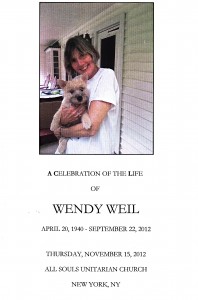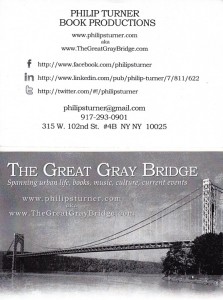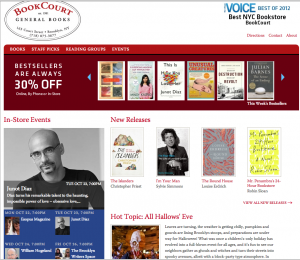 On Thursday afternoon I attended a lovely memorial, sweet and sad, for a longtime book biz friend, literary agent Wendy Weil. I’d learned of her passing on September 29 when, scanning the Saturday NY Times, my gaze had landed on her picture in a death notice. Struck with a sudden heart attack, she’d died one week earlier, on September 22, which happened to have been my birthday. I’d have been shocked and saddened regardless, but knowing she’d died on a day I was celebrating hit me especially. I was reminded me of the psalm-like phrase, “In the midst of life we are in death,” from The Book of Common Prayer. That day I blogged about Wendy at this post, “Wendy Weill, Book Agent Extraordiniare, RIP“, and made sure I cleared time to attend her memorial.
On Thursday afternoon I attended a lovely memorial, sweet and sad, for a longtime book biz friend, literary agent Wendy Weil. I’d learned of her passing on September 29 when, scanning the Saturday NY Times, my gaze had landed on her picture in a death notice. Struck with a sudden heart attack, she’d died one week earlier, on September 22, which happened to have been my birthday. I’d have been shocked and saddened regardless, but knowing she’d died on a day I was celebrating hit me especially. I was reminded me of the psalm-like phrase, “In the midst of life we are in death,” from The Book of Common Prayer. That day I blogged about Wendy at this post, “Wendy Weill, Book Agent Extraordiniare, RIP“, and made sure I cleared time to attend her memorial.
Attesting to personal qualities that engendered much affection and loyalty, and her sound professional judgment, nine author clients of Wendy’s eulogized her, and many more of her writers were in attendance. Authors speaking were Jim Magnuson; Beth Gutcheon; Phillip Lopate; Andrea Barrett; Nancy Salz; Alice Walker (by video); Anthony Doerr; and Karen Joy Fowler. Her playmate from toddlerhood, fellow book agent Lois Wallace, also spoke from her perspective of more than sixty years of shared friendship. A good short film was shown, made by Jessica Wallace, with Wendy speaking about women who keep, or don’t, their own family name upon marrying. Representing Wendy’s immediate family was her stepson, JT Ross, who allowed as he had probably been closer to Wendy than his own mother. At the very end, New Yorker editor Fran Kiernan read a eulogy from novelist Mark Helprin, who’d planned to be there but was prevented from getting to NYC by travel problems.
It was a personal disappointment to me that Helprin wasn’t there, as I had hoped to say hello to him and share memories of Wendy. In the early 1980s, my whole family and our Cleveland bookstore Undercover Books hosted Mark for very successful signings of two of his early books–A Dove of the East and Winter’s Tale. The second of those two events came in 1983, and was a proper launch party, with local book press and probably 150-200 customers. Critic Benjamin DeMott had only a few days earlier praised the novel expansively on the cover or the NY Times Book Review, and people came in droves. We kept pushing the book for weeks, and all Mark’s titles, especially Refiner’s Fire. Wendy heard of our store, and got a hold of me and asked to meet at an ABA, our annual book convention. I was delighted then when I met such a winsome, ebullient emissary from the New York publishing scene. When I left the bookstore in 1985 and moved to NYC to work in publishing, Wendy was excited for me. She was unfailingly helpful and full of encouragement and suggestions as I sought and then landed my first editorial jobs. Later, I always relished receiving submissions from her office–especially after she established her eponymous agency, in ’86–as I knew how carefully she chose her clients and the books they would embark upon writing.
The last time I saw Wendy she began our conversation by recalling our shared connection with Helprin. She excitedly told me she’d recently licensed a new novel of his, to Houghton Mifflin Harcourt. After I learned of Wendy’s passing, I realized that that novel, In Sunlight and In Shadow, was on the verge of officially being published, but she wouldn’t be around for the happy milestone.
Inside the printed memorial program, the front of which is pictured at the top of this post, people who’d like to make contributions in Wendy’s memory were asked to donate to the Women’s Media Group Scholarship Fund and/or the Teachers and Writers Collaborative, a worthy group that Phillip Lopate spoke of in his eulogy. I also found a flyer in the church vestibule promoting an effort to name a memorial bench in Riverside Park in Wendy’s honor, where she was fond of walking her cairn terrier, Bridie (shown on the program cover in Wendy’s arms).
I’ll close with a mention of Andrea Barrett’s moving eulogy. Andrea, who often incorporates elements of natural history into her work, had brought with her a book that Wendy once bought her as a gift, a sort of field guide to mosses. Andrea held it aloft from her place at the lectern, extracting from it samples of old mosses in tiny envelopes that previous owners of the book had pressed between its pages. Andrea read the tiny pencil-written notations that indicated where the specimens had been found and picked, and when. These were all from the 1930s, and lent a simple kind of homely poetry to the memorial. This example of Wendy’s thoughtfulness showed how much she cherished living things, from the plant or animal worlds, and from the realm of letters and the imagination. She was a dear friend, and will be missed so very much by so very many.

![]()










